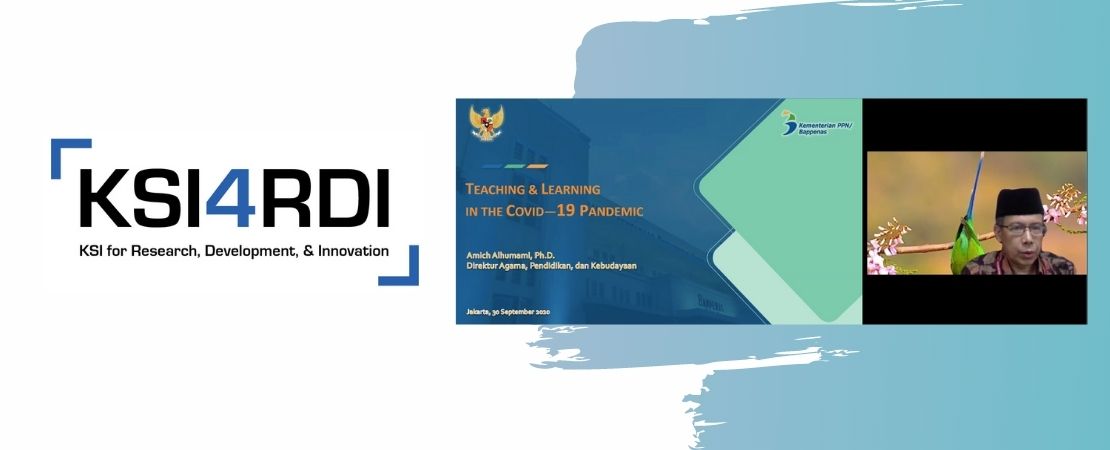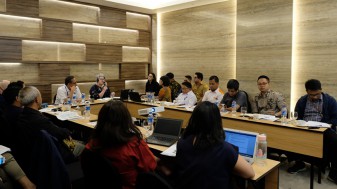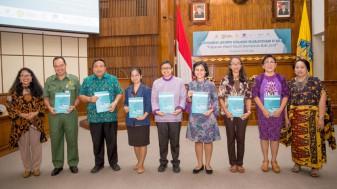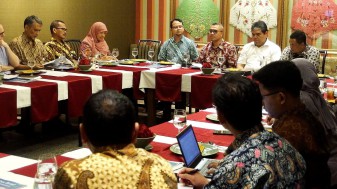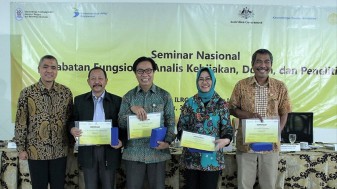Adjusting the education curriculum to respond to the impact of Covid-19 on the teaching and learning process is very important. It is hoped that the implementation of the emergency curriculum will provide flexibility for each school to implement the curriculum and apply a student-oriented classroom management.
This is one of the conclusions of the KSI4RDI #8 agenda: "The Covid-19 Pandemic Research Scope Discussion Series" which was included in Cluster 2 with the theme "Reviewing the Implementation of Curriculum in Education Units during Special Situations" on Wednesday (30/9). Speakers at the online discussion held by Knowledge Sector Initiative (KSI) included the Director of Religion, Education, and Culture of Ministry of National Development Planning/Bappenas, Amich Alhumami, Head of the Center for Curriculum and Academic Textbooks of the Ministry of Education and Culture, Maman Fathurrohman, Chairman of Learning Teachers Foundation, Bukik Setiawan, Chair of Schools Against Corona, Rizqi Rahmat Hani, a researcher at Indonesian Academy of Young Scientists, Tuswadi, and researcher at Article 33, Petra W Bodrogini. The moderator in this discussion was Vivi Andriani, Head of Secondary Education Sub-Directorate, Ministry of National Development Planning/Bappenas.
Amich Alhumany, Director of Education and Religion of the Ministry of National Development Planning/Bappenas, in his remarks stated that the pandemic had made a significant impact on the education sector. We were forced to switch to distant learning method, utilizing various available digital platforms to sustain the continuity of learning. Effective online learning strategies became crucial to ensure good teaching and learning process that would not put too much pressure on students. This led to the need to discuss how the relevant curriculum had to be accordingly developed. "Instead of focusing on covering everything laid out in the curriculum, we hope that emphasis should be given more on conveying the key, important content," he explained.
Head of the Center for Curriculum and Academic Textbooks, Ministry of Education and Culture, Maman Fathurrohman said the obstacles to distance learning activities during the pandemic were experienced by teachers, students and parents. One of them was the difficulty to meet the demands of the curriculum. The national curriculum was designed for a normal situation, thereby making it somewhat challenging when implemented during a pandemic. Therefore, the Decree of the Minister of Education and Culture Number 719/P/2020 was issued to provide Guidelines for Implementing the Curriculum at Educational Units in Special Conditions, which became known as the emergency curriculum. The goal was to provide flexibility for educational units to customize the appropriate curriculum to suit the students. With this regulation, every school that undergoes a special situation is not required to complete the entire curriculum as it can make simplification thereto and create its own curriculum.
According to Maman, this emergency curriculum did not only apply in the situation of the Covid-19 pandemic. Areas that were affected by a disaster could also apply it. "Because the impact during a disaster varies from one region to another, the situation in each area will be different. This flexibility is needed and governed by a regulation that has been promulgated, "he explained.
Bukik Setiawan, the Chair of the Learning Teachers Foundation, said that a number of teachers in state schools had proven to be capable of making modification to meet the distance learning needs and to make the process more student-oriented. Schools Against Corona Program had developed a distance learning guideline which could be downloaded for free, and a number of teachers who used this guidelines were able to do distance learning with relatively good results.
With respect to the curriculum, Bukik emphasized that Indonesia had undergone a crisis in its education sector even before the pandemic hit. This was because the national curriculum was too heavily loaded with learning strategies that were not student-oriented. The pandemic situation made these problems even more pronounced. Complaints about the technology-related challenges during this pandemic were only part of the impact of the crisis. "The biggest problem with distance learning is not technology, but classroom management because this is what is most difficult to handle. So now we have to move forward to support teachers to improve classroom management," he said.
Head of School Lawan Corona (Against Corona), Rizqi Rahmat Hani, added that his organization had collected a number of experiences of teachers in implementing distance learning in a number of areas. There were some issues, ranging from quality or absence of signal, supporting tools, costs to buy internet quotas, to teaching methods. However, a number of teachers were able to find solutions to overcome these problems. "There are those who maximize the use of WA (Whatsapp) and use emoticons to complete the list of attendance, games to learn grammar, and so on. After some trial and error, teachers learned from various sources and some chats with parents about the availability or supporting facilities and infrastructure or the best time to learn for children, allowing teachers and parents to be committed," he said.
A researcher at the Indonesian Academy of Young Scientists, Tuswadi shared the results of his research related to teaching and learning activities during the pandemic in nine schools in Banjarnegara District, Central Java. In conclusion, teaching and learning activities in nine schools were generally carried out remotely, applying a simplified curriculum. The achievement of the curriculum was in the range of 50 percent, a relatively unsatisfactory performance according to both teachers and school principals. The main obstacles encountered in distance learning included problems with internet signals and the affordability to buy internet data quota.
A researcher of Article 33, Petra W Bodrogini shared the results of the preliminary study related to efforts to understand how education was carried out during the time of crisis. A number of recommendations were offered pertaining to how to rebuild and improve the education sector. From the policy standpoint, there needed to be an adaptive policy equipped by a data-based monitoring and evaluation mechanism. From the curriculum point of view, there needed to be a distance learning design encapsulating various modalities. From the teacher and student’s standpoint, support had to be provided for teachers so that they could continue to develop themselves and the psychosocial support for students. In addition, efforts were also needed to bridge the existing digital gaps by promoting the optimal use of technology.
In the closing, the moderator, Vivi Indriyani Head of Secondary Education Sub-Directorate of Bappenas, stated that the uncertainty as to when this pandemic would end would further bring implications to the education system. Therefore, it was important to re-direct the mindset of the educators, especially in the face of a new normal situation, which required adjustments according to the global health standards once the pandemic has passed. The impact of the pandemic and the “learning from home” method (BDR) had brought was the accumulative learning loss, for which alternative solutions needed to be identified to mitigate the risks. So, discussions on how the gaps in the implementation of distance learning both on the side of teachers and students had to be supported by developing a flexible but relevant Learning From Home (BDR) guidelines and an adaptive learning method available to the teachers when they applied the emergency curriculum.
KSI4RDI (KSI for Research, Development and Innovation) is an interactive discussion initiated by Knowledge Sector Initiative (KSI) in partnership between the Indonesian and Australian governments with funding from the Australian Department of Foreign Affairs and Trade (DFAT). KSI4RDI discussion is held twice a month with the aim to promote the use of evidence to inform the policy-making process, thereby encouraging policy makers to produce more inclusive and targeted policies.

